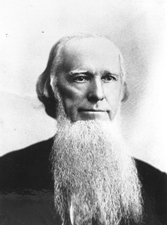
On Monday last, R. Albert Mohler of the Southern Baptist Theological Seminary of Louisville, KY, where I did my doctoral work, announced that the seminary would vacate the Joseph Emerson Brown Chair of Christian Theology Mohler has held since 2005 because Brown, Confederate governor of Georgia during the Civil War, after the war, made use of the “convict-leasing system” to operate his Dade County coal mines in North Georgia, gaining Brown considerable wealth. The “convict-leasing system” (slavery by another name) used out of work individuals, mainly blacks, incarcerated for the crime of joblessness. These “convicts” were “rented” to local businessmen who treated and brutalized them like slaves. If there was a “hell on earth,” it was in Brown’s mines. Brown, a Southern Baptist layman, gave $50,000 at a particularly desperate time in the history of the seminary to help it continue to operate. Brown “saved the seminary” with his financial gift. The seminary named its chair of theology in his “honor.”
In recent times, some have called for the seminary to remove the names of the slaveholders which are attached to the various buildings, halls, etc. at the seminary. The seminary founding fathers, James P. Boyce, Basil Manly Jr., William Williams, and John A. Broadus owned 51 slaves between them. While the seminary board rightly decided to remove Brown’s name from its prominence at the seminary (Mohler going forward will hold the Centennial Chair of Christian Theology), the Board chose to retain the names of the founders that may be found around the campus—the James P Boyce Library, Broadus Chapel, etc. In addition, five million dollars has been allocated to provide scholarships for African American students, to be doled out in increments until the five million has been exhausted. For Mohler’s report, see here. For other articles on this story, see the report in World, the progressive Baptist news outlet Baptist News Global and Louisville’s local paper, The Courier-Journal. Mohler, in justifying the Board’s decision, argued that the Bible honors men that had feet of clay. David, the sweet Psalmist of Israel and a man after God’s own heart, was an adulterer and a murderer. For his part, African American Southern Baptist pastor Dwight McKissic thinks that Mohler’s position of removing the prominence of one man’s name and not another is an inconsistency that another generation of Baptists will have to deal with.
I am neither going to weigh in as to what the seminary should do vs. what it has already done. Nor am I going to criticize Mohler and the Board for its failures. This is a complex issue that won’t easily be solved. I, for one am glad to see the J. E. Brown chair of Christian Theology vacant. Brown, as a layman, did some ugly, sinful things while professing his love for God. His current reality is up to a righteous and holy God. But his legacy needs to be repudiated. If I take this position, doesn’t this suggest I should favor the removal of the names of the founders for the same reasons? Perhaps. But perhaps not. Why?
As a matter of providence, I have not posted in recent days because I have been working intently on a paper “Baptist Emancipationists and Abolitionists – The American Story” to be read at the annual meeting of the Evangelical Theological Society next month. The meeting was to be held in Providence, Rhode Island but was switched to a digital meeting due to the COVID pandemic. The paper was to be uploaded to a special website for the meetings by October 15th. I am pretty pleased with the paper’s outcome and look forward to feedback from other scholars. The plan is that this will become a part of a monograph that I am working on entitled at this point Baptists and Slavery. This whole question that Southern is seeking to address has been a matter of intense investigation for me over the past few years—How should Baptists reckon with the past and how should we go forward?
I recently read a book published this summer, White Too Long, where the author, Robert Jones, charges white Protestantism with creating white supremacy. (Coincidently, if you read the article about Southern in the LouisvilleCourier-Journal linked above, you will find reference to this book.) In setting forth his case, he uses Basil Manly Sr., prominent Alabama Baptist leader and author of the Alabama Resolutions (a test case for slavery that resulted in a fractured Baptist missions movement in 1845), and asserts Manly “was widely recognized as the leading theological apologist for slavery in his day.” Well to be sure, Manly was a strong defender of slavery, but the “leading theological apologist”? Superlatives are “always” hard to prove. He referred his readers to A. James Fuller’s fine biography of Manly, Chaplain to the Confederacy as proof. I reached out to Jim Fuller, professor of history at the University of Indianapolis by email. In his lengthy response, he informed me that not only did he not argue for this in the book, he didn’t believe it to be true. He wondered how carefully Jones had read the book to draw this erroneous conclusion. This is the problem in debate. Making a statement is easy, proving it is something else.
Well, whether Manly was or wasn’t “the leading apologist”—the reader should peruse Robert L. Dabney’s Defence of Virginia (1867) for an actual leading apologist of slavery—the Baptists had many defenders—P. H. Mell of GA, Thornton Stringfellow of VA, Richard Fuller of Maryland, Richard Furman and Iveson Lewis Brookes of SC, etc.—but among the Baptists there were some prominent emancipationists who believed that chattel slavery was immoral, contrary to the public good (it produced sloth and avarice among those who kept slaves and demanded brutality to maintain slavery), and it was unbiblical. In 1808, former Virginia Baptist, then resident of Kentucky, David Barrow wrote the first Baptist defense of emancipation. He used the Scripture to refute the biblical arguments put forth by the pro-slavery men to support slavery. One “argument” I especially like–“Our high-toned Calvinist or rather fatalist, says God decreed that slavery should exist; to which you ought to add, God is the author of sin.”
I don’t have time here to discuss the problem of evil, the only real theological problem worth talking about. No, I don’t think the number of toes on the Beast is really worth arguing about. But the problem of evil? Now here’s a debate worth having. Back to slavery—Barrow’s point was that the Bible rightly used would not support the kind of slavery which was built off “man-stealing.” There were so many problems with slavery that I have a hard time wondering how good men like Boyce, Broadus, et al. failed to see its evil nature. But they know better now.
Regarding the question of what to do with our heroes who on closer examination, are not so heroic, I have high regard for the founders of Southern Seminary. Before I knew their full story, these were the men of Christian legend, worthy to be added to Hebrews 11 . . . men of whom the world was not worthy. But to a man, they had feet of clay. Yes, they owned slaves. Sadly, in this they were wrong. What should we do with their legacy? What should we do with the legacy of any sinner? The best of men are only men at the best. Abraham was a deceiver, David a murder, Peter denied his Lord, not once but multiple times and with an oath. The Great Awakening evangelist George Whitefield owned slaves and used them to provide for his orphans. Boyce, Broadus, Manly, Williams and a host of other Baptists owned slaves. These are the facts of history. God help me to be better! But I too have feet of clay. What sin in my life am I missing?

0 Comments